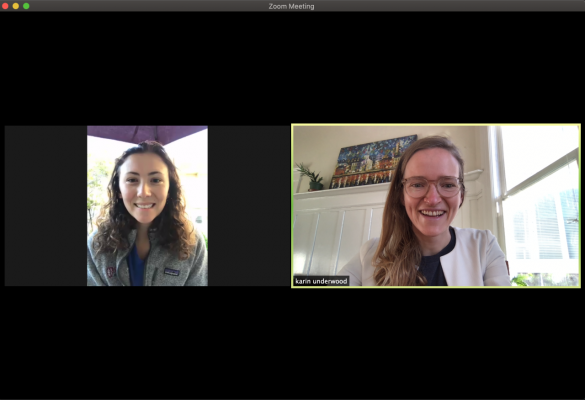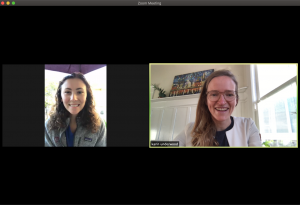
CoachMe leaders Morgan McMahon and founder/CEO Karin Underwood (right) on Zoom.
When a northern California health coach brainstormed with a client with diabetes about how to stay healthy during the COVID-19 lockdown, they came up with an epiphany: Online Zumba classes with her granddaughter.
This inspired one of the woman’s daughters, who suffered from anxiety and had gained 26 pounds during COVID-19, to get moving as well, according to Karin Underwood, 30, the founder and CEO of CoachMe, a virtual coaching program for people with diabetes.
Zumba dancing led the client, who was in her early 60s, to do some running during the day. During her weekly blood tests, she’s found her blood sugar levels have dropped from the diabetic range to that of pre-diabetes. “What was touching was that she asked us, a little nervously, ‘Can I still have a health coach?’” recalls Underwood.
The answer was yes, and there was a side benefit from the grandkids: the nickname “fun grandmother.”
This is just one of the remarkable stories from CoachMe, a technology-based coaching program for people who use Medi-Cal, California’s version of Medicaid. Only nine months old, the organization is designed to help people with chronic health problems reach their health goals and reduce visits to the emergency room.
Although Medicaid provides urgently needed insurance to low-income Americans, people using it still represent 62 percent of all emergency room visits. They also tend to use the emergency room more often for non-urgent conditions than other groups. This is significant, since ER visit for non-urgent health problems racks up thousands of dollars that would be better spent on preventive care.
That’s a problem Underwood and CoachMe want to help solve. “In talking with people, we asked them what would be most helpful to keep them on track with their health goals,” Underwood says. “And it turns out that some just really want someone to talk with – someone understanding and supportive who will help keep them accountable.”
A passion for innovation
CoachMe combines two of Underwood’s passions: tech innovation and health equity.
Both her parents were IT professionals, and growing up in West Chester, Penn, she was interested in health and social impact from a young age. After graduating from Washington University in St. Louis, she worked mProve Health, a mobile technology startup, where she developed a passion for building technology that meets patients’ needs.
She went on to explore international health, working at One Acre Fund in Kenya, a nonprofit designed to fight poverty and hunger by doing sustainable agriculture training for smallholder farmers. She also did a stint at a health startup in Burma, helping build a mobile app to send health messages to new mothers. “Abroad, I saw how the simplest solution could have massive impact if delivered in the right way,” she told one interviewer.
In 2019 Underwood graduated an MBA from Stanford and was awarded a Social Innovation Fellowship from the school, which she used to develop CoachMe. “I was passionate about being able to take an idea and move it forward – in this case, how primary care could use health coaches as a key to success,” she said.
She enlisted Morgan McMahon, a former health coach at Iora Health and a physician’s assistant-in-training, to help her develop the program and pilot study.
“COVID was a huge opportunity to take a step back and think about the kind of program we wanted,” Underwood explained. “We’ve moved away from using an app and are focused on text messaging and talking. It’s been great to meet patients where they are.”
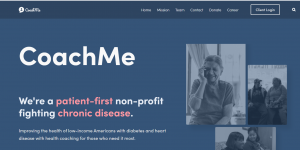
CoachMe is currently doing a pilot program involving three coaches and 70 patients referred from MayView Community Health Center in Santa Clara County and Samaritan House San Mateo, partners that Underwood describes as a “forward-thinking, community-minded, and engaged.”
Patients begin with an intake interview with a health coach who uses motivational interviewing techniques, tying health goals to their life goals, hopes and dreams for themselves and their children.
Using a strategy for peer coaches developed by the University of California at San Francisco, the coaches have weekly 10- to 15-minute phone or video visits with low-income patients who have diabetes; some also have high blood pressure and high cholesterol. They talk, joke, commiserate, set health goals together and brainstorm on how to reach them. Between visits coaches check in via text. “We’re very clear on what on what a health coach is – we’re supplementing the work of doctors and other providers,” said Underwood.
Weekly glucose blood readings and feedback from the patients suggests that the health coaching helps them manage their disease – something supported by research about health coaching and diabetes.
In one study, people with type 2 diabetes who received health coaching were able to lower their A1C — the best indicator of long-term blood glucose control — and sustain that improvement even after the coaching ended. Another study found that not only did A1C levels and medication adherence improve, but patients reported less stress, a better mood, and a stronger feeling of social support.
And virtual coaching also got a thumbs-up: A study published in BMJ Open Diabetes Research and Care found that 64 percent of people with diabetes that completed a 6-month program (on a mobile platform with human coaching) lost 5 percent of their body weight.
From her work with safety net patients, “we see so much potential in virtual coaching for people with diabetes,” said McMahon. CoachMe, she says, is also experimenting with virtual support groups, which it is testing via text messaging. After the coaching program, she says, “the support groups could continue to motivate and support each other.”
Coaching in the time of COVID-19
Even before COVID-19, considerable evidence supported the use of telehealth for counseling and remote home monitoring of patients with chronic conditions, according to the Agency for Healthcare Research and Quality.
For its part, CoachMe has seen a doubling in volume of clients during the pandemic. The clinics have helped the team identity those most in need, so the team can do outreach through mailers, text messages and calls from providers. “We’ve been able to see the journey people are going through with COVID-19 up close, and they can turn to us for support,” says McMahon.
This support includes referrals to food banks, rental assistance and counseling to an increasingly desperate clientele. As one client told Underwood, the lockdown “has been going on two months, and I don’t know anything about work. I’m hoping it doesn’t take much longer. I’m running out of money. My landlord wants to be paid and doesn’t want to wait.”
Even under these circumstances, her clients are enormously resilient, according to Underwood. Highly motivated to stay safe, her clients are busy making masks to wear to work. Those who need legal or emergency help appreciate the coaches’ help in navigating the relief system. “Our clients prefer that a trusted person make the call to 211 — we’ve definitely found that just giving out links isn’t enough,” she said.
Underwood is also struck by her clients’ compassion. “One thing I found really surprising is that some people who’ve lost their jobs and are concerned where their food and medicine are coming from are reluctant to accept help,” Underwood said. “They’ll say, ‘There are a lot of people out there who need it more than me.’ They worry others need it more. So we’re redefining it as something they deserve and need.”
But clients with diabetes are eager to brainstorm about exercise and healthy meals, she reports.
“People value outreach during this time,” she says. Clients tell CoachMe coaches in Spanish that ‘I’d kill for tortillas but tortillas kill me’ – referring to weight gain – so coaches suggest traditional dishes that are tasty but have more vegetables and fewer carbs. In setting goals for exercise, they are sensitive to clients who are afraid to venture outside during COVID.
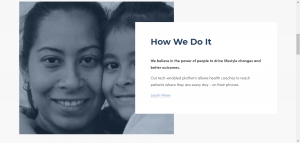
In one case, the health coach and client came up with a novel solution: Eat less sugar and walk around the dining room table.
This was because the client – a low-income, high-risk patient – was determined to stay active during the pandemic. She was too anxious about catching the virus to go outside, however, and doing vigorous exercise in her apartment would shake the floor and annoy other tenants.
Instead, she ended up walking around the table 200 times a day. “She told us, ‘I do 100 steps around to the left and then 100 to the right… Yes, it makes me a little dizzy, but I laugh and I have fun with it,’” she recalls.
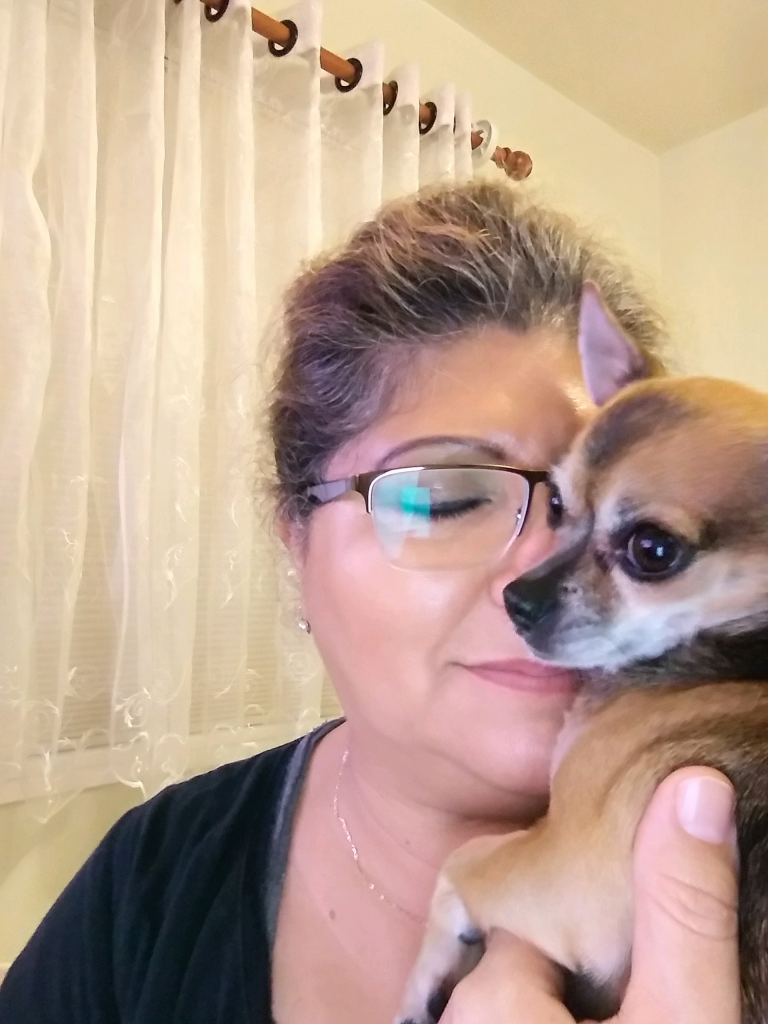
A CoachMe patient shares her special brand of stress relief
CoachMe has also done a lot of stress and anxiety coaching during COVID-19, as well as sharing breathing exercises to relieve and anxiety. If a client is feeling depressed or suicidal, coaches refer them to a doctor for treatment.
“Our clients are under an enormous amount of stress right now,” Underwood says. “We talk about what brings them joy, what they can change, what they have control over, and how they can get unstuck.” One client, who started exercising again as a result, told her coach that “it was nice to have someone listen to me and validate how I was feeling.”
In one case, a woman who had worked as a janitor was suffering from debilitating stress after being laid off during the lockdown. Unable to make the next month’s rent, she agonized about it so much she was unable to sleep. During a coaching session, Underwood reported, she decided to climb up and down her apartment stairs over and over for exercise. Over the next few weeks, to both their surprise, her insomnia went away.
These small steps appear to be adding up to big gains. “We’ve seen people whose fasting blood glucose readings were in the 200s and 300s dropping down to a 100 to 140 range, which medical associations say lowers COVID risk,” says Underwood with satisfaction. “We’ve also seen people in the 140-150 range have dropped to a safer range in the lower 100s.”
The diabetes patients are not getting their quarterly A1C tests due to COVID-19, but CoachMe looks forward to getting some A1C labs as more clinics begin scheduling in-person visits. CoachMe’s six-month pilot study will end this fall, and Underwood and McMahon will analyze the data with their partners’ assistance and approval.
In the future, CoachMe hopes to draw peer coaches largely from the Medicaid population. “They tend to have a great understanding and empathy about what people are going through and are good at building trust with them,” Underwood said. “People are eager to connect – and having a shared community background is important.”
Right now the program is grant-funded, but the two young women are working on a strategy to make the program pay for itself.
“We’re excited to see some patients starting to go back to work now, but many are still facing financial struggles,” Underwood says. “As clinics start to think about bringing people back in, we want them to know that remote care is still a really powerful option. And we’re talking to partners about what the next model of care looks like.”
Find this useful or interesting? We’re constantly sharing stuff like this. Sign up to receive our newsletter to stay in the loop.

